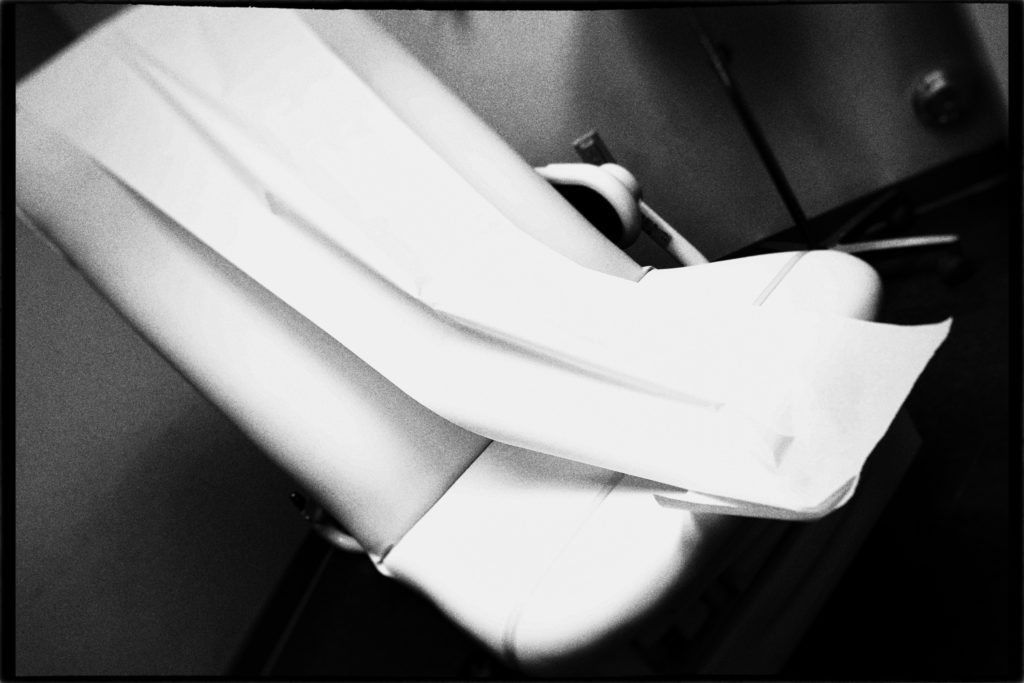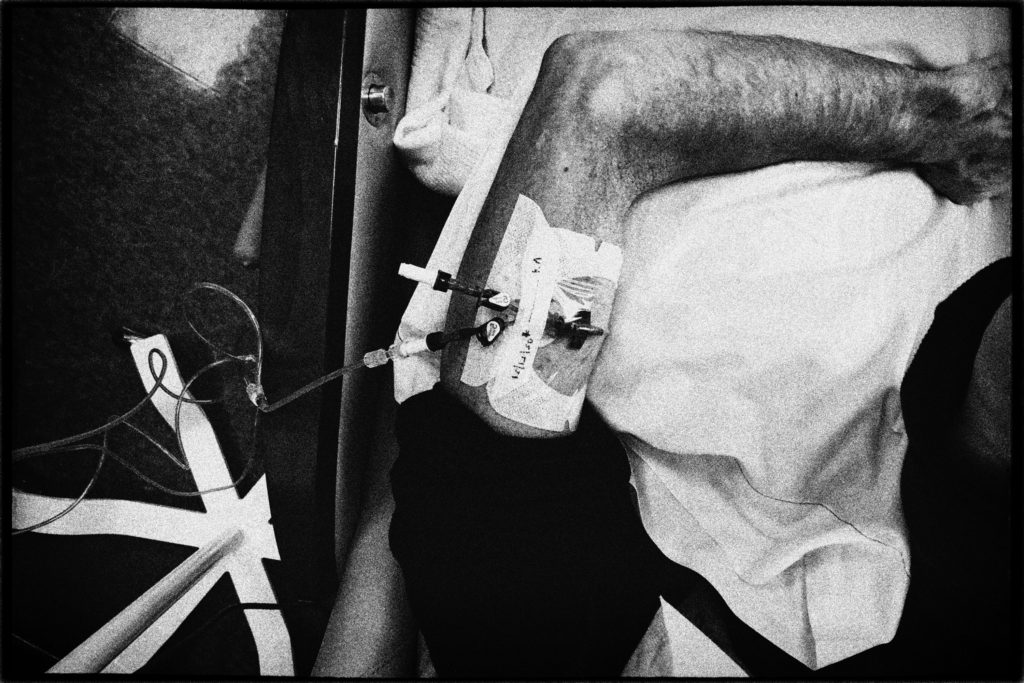
Self Portrait with Feeding Tube, Raleigh, North Carolina, November 2020
I’ve been reading up on Diane Arbus recently. She’s someone I’ve always known about but never really taken to; there’s something off-putting about her work that makes me queasy when I look at it. It bothers me. I don’t think it’s because of the common criticism of her – she’s “exploiting” her subjects for her benefit; we, by definition, “exploit” the people we photograph – so much as what it says about her. Her daughter, Doon Arbus, in her postscript to the posthumous publication entitled Untitled, claimed her mom “wasn’t interested in self-expression,” which is a stunning misunderstanding coming from someone who should know better.
As William Todd Schultz argues in his fascinating ‘psychobiography’ of Arbus, An Emergency in Slow Motion: The Inner Life of Diane Arbus, Arbus’s work was all about herself, her externalization of an inner world produced by individual trauma. I recommend Schultz’s book to anyone interested in understanding the artistic process and what creates and nurtures it. From what I can see, Arbus had one fucked-up internal life. Maybe it explains why she took her own life at 47. Insofar as any work of art can be ‘explained,’ it explains it, or, at the least, puts it into a context that helps open up a dialogue with the artist and enhances the experience of the work itself. It’s made me rethink her work as something she wanted to tell me.
All of this is prelude to the fact that I’ve been contemplating documenting my recent medical experiences and putting them out there for you. You could read that as objective documentation or shameless self-absorption, depending on how you feel about what motivates these ‘documentary’ desires. What’s so special about me and my experience? Nothing. That doesn’t mean it isn’t my experience, and it doesn’t necessarily preclude me from sharing it with you in a way that might – just might – mirror to you your own experience in some way. It can easily lapse into vulgarity, become a cheap attempt for attention or sympathy, but I’ll assume the risk. Frankly, the attention doesn’t interest me at all. When I started Leicaphilia years ago I did so with the intention of remaining anonymous, and I kept it that way for a number of years. But as time passed, and readership sorted itself out, I gradually engaged the blog to discuss more personal things, which seems more in the spirit of what I do as a ‘documentarian.’ Isn’t that the function of ‘documentary’ photography? The alternative is pictures of cats and fence posts.
*************

Checking in for Chemo
So, as regular readers know, I’m currently in the process of beating cancer or having it beat me. Stage Three Stomach Cancer. Nothing more traumatic than what millions of people experience every day for any number of reasons. Actually, I’m tempted at times to see my current travails as a blessing, a pedagogy about life, its value, and maybe even its meaning [I’m still unsure about the latter]. But it’s occurred to me that it would make a potentially interesting photo essay, and Leicaphilia gives me a platform to present it. So, that’s what I’m going to do, among all the usual things, going forward. Or, at least it’s what I’ve chosen to do today.
All of the photos below were of my chemo visit yesterday. Today I’m home, hooked up to some Frankensteinian device pumping poison into my system for two more days, after which I get monitored to see if my white blood cells are falling dangerously low and potentially necessitating another hospital stay. Luckily, my oncology doc tells me I’ve apparently got a very strong immune system. My white blood cell counts remain normal after chemo. As such, I don’t require the $8000 shot usually given to people after each chemo round. $8000 each shot, money upfront. That’s $64000 out of pocket for 8 rounds, not covered by any insurance I possess. When they scheduled me for it and explained the cost, I laughed. Right, like that’s gonna happen. America health care – all I can do is shake my head.





Views: 11

Well,
Some brutal pics. Not a criticism, but a counterpoint to all the happy people on TV who are suffering from cancer and are out sailing, working on their vintage autos or descending upon local farmer’s markets.
Cancer is evil. But cancer is here, and it becomes part of some people’s lives.
In 2013, I managed to shatter my right elbow in spectacular fashion. I was on a 3 day trip to DC for services at the Viet Nam Memorial. It was November. 10 days in the hospital in DC. New artificial elbow. 9 months of PT. The day I was released from PT, my older brother (#1) was diagnosed w/cancer. Good timing for me, bad for him I drove him to chemo every two weeks for his entire treatment. He survived. I was humbled by the everyday courage people displayed. Would I have the intestinal fortitude to face what they face? I just don’t know.
Weeks after he was declared cancer-free, older brother (#2) died from cancer related conditions.
Now, not a pity response. When I was getting my new elbow, a 20 year-old soldier was brought in w/a TBI suffered in some godforsaken corner of the terrorist world. 19 year old wife & a 8 month old child. Both crying at his bedside. People said I was unlucky…hell no! Pray for that soldier and his family. They have a life sentence. I’m healed. Brother #1 would get mad if someone pitied him. Look at the 6 year-old girl with the pink crutches and one leg, he’d say. I’m lucky. Brother #2 beat lung cancer twice. He lived long enough to see two grandchildren born and his son marry a wonder woman. Unlucky, no. He’d see someone in the hospital and befriend that person. He’d tell us he felt sorry for the guy because the guy’s wife left him when he got sick.
One thing is for sure…the medical teams who work on us are saints in the purist manner. I told one nurse I met in the children’s oncology ward that no matter what she did on this earth, all would be forgiven when she got to heaven because when people were at their rock bottom, she was her best. Unless you’ve seen this first hand, you might dismiss this as trite. It isn’t.
As I see it, this is life. We get dealt good hands & bad hands. Call it Karma, call it God’s will. Call it ‘life sucks.’ Take a great photo? Good. The next one might be crap.
Continue taking the photos if you wish to. Shut down your site if you wish to. It’s your life, you need to do what you need to do to get thru this. I will pray for your family.
There’s previous history on your decision: Helmut Newton covered his stay in hospital with heart problems. I have a sort of moral code about this: it’s perfectly legitimate for someone to document his own story, but a bit dodgy doing it about another person. Avedon photographed his father as he passed away, and Leibowitz did a fairly graphic and extensive cover of the end of her essay-writing friend’s life. I have no idea how in accord either of the two departed were with the photography project each faced, but it isn’t for me and never, ever appeared in my own mind as something I’d do in the case of my own wife’s death. It was all I could do to understand that it was not just a nightmare, and that I’d wake up at any moment and we’d just get up and have a quiet breakfast as if nothing had happened. I believe that’s what will probably happen after my own goose is cooked. It would be gratifying to be right, and if I’m not, how could I tell?
As I say, it’s an entirely personal decision you’ve made, and I really do believe that it’s a good one. An alternative would be to curl up and give up, which is bullshit. I think that a positive attitude is a very powerful instrument, and I have learned to be the last one to base beliefs in these matters on the “scientific” evidence; we hardly understand how pigeons know their way back home, how a salmon can pretty much swim across the world yet find the stream of its own genesis. Disbelief isn’t science either: it’s opinion derived from common lack of knowledge about the subject. The more science uncovers, the more I think we should realise that we are just scratching at the surfaces of everything.
I look forward to reading more of your reports and perhaps seeing a little less underexposure in that camera… 🙂
Rob
That’s not underexposure; that’s ‘gritty, dark realism.”
“That’s not underexposure; that’s ‘gritty, dark realism.”
😉
I was searching the Internet a day or two ago and discovered that Frank Horvat had recently passed away at a ripe old age. He had led an interesting life punctuated with some great photographs.
http://www.horvatland.com/WEB/main.htm
Fluent in several European languages, he worked during what may have been the peak period for international magazine publication. He first crossed my little radar set when I was buying the English photography magazine called, aptly, Photography, edited by Norman Hall. It’s where I had my first published picture, sharing a spead with Peter Sellers, actor: he had Britt Ekland whereas I did not. Sadly, as a magazine, it was not to survive. Never did understand why Amateur Photographer did make it through, but Photography couldn’t. Not that I have anything against the former, of course, which was where I picked up much of my early photography tips on processing.
By the way, how did you get to do so much reading and still lead a personal life, which you clearly manage to do? I do practically nothing, and it takes all my time to achieve that. The most I’ve read in recent times has been Hold Still, the Sally Man autobiography. I have to admit, either I don’t take in very much at a time, or she fascinates me: I’m on my third reading. I think she is a better writer than photogapher, and I do admire some of her photography, which is obviously why I bought her book.
Rob
Thanks for the kind words about my Arbus book. It means a lot to me that it registered strongly for someone like you who clearly gets what making art is about and what the process entails. Best wishes to you in your treatment.
Todd:
I’m honored to have you as a reader. Frankly, I was blown away by your book. It’s brilliant, really. I learned more about Arbus than I’d ever thought. Clearly a labor of love on your part. I’ve just ordered your Capote book to read next.
When I was a grad student at Duke I took a seminar on psychobiography with a professor whose name escapes me now – Irving Alexander maybe? he’d written a book on psychobiography. Fascinating subject, so I was really excited to see your Arbus book. It didn’t disappoint.
Thanks for reading Leicaphilia.
I knew Irv well! He was a wonderful man. I wish he were still around.